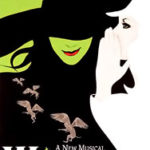 The Broadway production of the mega-musical Wicked opened at the Gershwin Theatre on Oct. 30, 2003, after its world premiere at San Francisco’s Curran Theatre. The idea for the show began when Stephen Schwartz read Gregory Maguire’s 1995 novel Wicked. In 1998, Schwartz secured the rights and asked Winnie Holzman to help develop the show over the course of the next year. For its developmental workshops, Kristin Chenoweth was Glinda and Stephanie J. Block was Elphaba, before Idina Menzel joined in the latter role during 2000. The original Broadway cast included Kristin Chenoweth (Glinda), Idina Menzel (Elphaba), Norbert Leo Butz (Fiyero), Michelle Federer (Nessarose), Christopher Fitzgerald (Boq), Joel Grey (Wizard), Carole Shelley (Mme. Morrible), and William Youmans (Dr. Dillamond).
The Broadway production of the mega-musical Wicked opened at the Gershwin Theatre on Oct. 30, 2003, after its world premiere at San Francisco’s Curran Theatre. The idea for the show began when Stephen Schwartz read Gregory Maguire’s 1995 novel Wicked. In 1998, Schwartz secured the rights and asked Winnie Holzman to help develop the show over the course of the next year. For its developmental workshops, Kristin Chenoweth was Glinda and Stephanie J. Block was Elphaba, before Idina Menzel joined in the latter role during 2000. The original Broadway cast included Kristin Chenoweth (Glinda), Idina Menzel (Elphaba), Norbert Leo Butz (Fiyero), Michelle Federer (Nessarose), Christopher Fitzgerald (Boq), Joel Grey (Wizard), Carole Shelley (Mme. Morrible), and William Youmans (Dr. Dillamond).
The creative team was Winnie Holzman (book), Stephen Schwartz (music, lyrics), Stephen Oremus (music direction), William David Brohn (orchestrations), Joe Mantello (direction), Wayne Cilento (choreography), Eugene Lee (sets), Susan Hilferty (costumes), Kenneth Posner (lights), Tony Meola (sound), Elaine J. McCarthy (projections), Tom Watson (hair & wigs), and Joseph Dulude II (make-up). The production won three 2004 Tonys. Below is the original cast performing “Defying Gravity” at the 2004 Tony Awards.
The original Broadway cast recording was released Dec. 16, 2003. It received the 2005 Grammy Award for Best Musical Show Album and was certified platinum in 2006, then double platinum in 2010. In 2012, Universal Studios was reported to be producing the film with Stephen Daldry as director for a 2019 release. In 2018, Universal put the film on hold and announced a new release date for 2021, but in April 2020, the film was on hold again, and Daldry left the production in October.
In 2018, NBC-TV broadcast A Very Wicked Halloween: Celebrating 15 Years on Broadway, hosted by Menzel and Chenoweth, featuring Ariana Grande, Pentatonix, Adam Lambert, and others to a live studio audience at New York’s Marquis Theatre.
